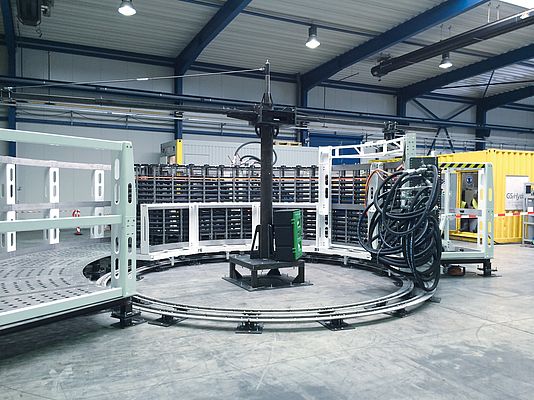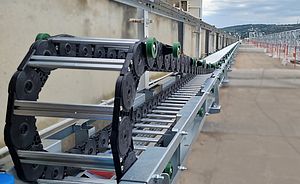A solid stainless steel cable carrier with a support structure for a rotating tower crane from AXTech has been designed and released by Tsubaki Kabelschlepp. It is used on the gigantic multi-function vessel “North Sea Giant” in the offshore business. The resulting solution takes into account the limited packaging spaces and strict requirements of this application and has been used successfully for 2.5 years. A close cooperation with the customer made it possible, together with advanced 3D simulations during the design engineering phase and, last but not least, extensive testing under realistic conditions.
SHS Tower Crane
With a lifting capacity of 420 tons, the innovative SHS Tower Crane from the renowned Norwegian manufacturer AXTech allows installation and maintenance of subsea systems and technical equipment in the North Sea: with a motion radius of 180°, it can lift heavy equipment and systems from the ship's deck and into the sea. 15 hydraulic hoses with a working pressure of 450 bar ensure supply to the crane. Due to the rotating motion of the crane, it is necessary to guide the hoses during the movement. This is ensured by a customized cable carrier from Tsubaki Kabelschlepp. The crane system is operated and maintained by TechnipFMC, a global leader in oil and gas projects.
“The function and – most importantly – the safety of the entire facility depends crucially on the energy supply to the crane,” Jens Stadter, Vice President Cable Carrier Systems, Tsubaki Kabelschlepp Group, explains. Designing suitable cable carriers is consequently a demanding task: “This application involves varying loads of up to 400 tons – a challenge which is made even more difficult by the extreme conditions on the open sea.”
The background
The cable carriers are positioned at the base of the crane, only a few meters above the water's surface, and therefore regularly fully exposed to the salt water. At the same time, they have to function without interruptions even under extreme weather conditions. Another important factor is a high level of stability of the cable carriers, taking into account the ship's motion in rough seas.
The overall solution developed by Tsubaki Kabelschlepp using 3D simulations meets all these requirements – demonstrably, as the cable carrier was tested extensively and deemed suitable during a factory acceptance test before commissioning.
Tsubaki Kabelschlepp also achieved top marks for the design of the entire cable carrier system: the steel structure was pre-assembled on land and then lifted onto the ship with only 3 lifting cycles. This allowed assembly time on the ship to be reduced to a few days.


















